Linbarger Company: Navigating Ethical Issues in Financial Accounting
VerifiedAdded on 2023/06/11
|5
|927
|154
Case Study
AI Summary
This case study examines the ethical dilemma faced by the financial controller of Linbarger Company, who is pressured to manipulate cash receipts to meet loan terms. The core issue revolves around poor cash management practices, leading to a potential breach of loan covenants. The analysis explores the ethical implications of falsifying financial data, the potential negative impacts on stakeholders, and the importance of maintaining professional integrity. It suggests alternative solutions, such as negotiating with the lender, incentivizing early payments, and seeking employee support, to address the cash shortfall without compromising ethical standards. The case emphasizes the long-term risks associated with unethical behavior and the need for proactive cash management strategies.
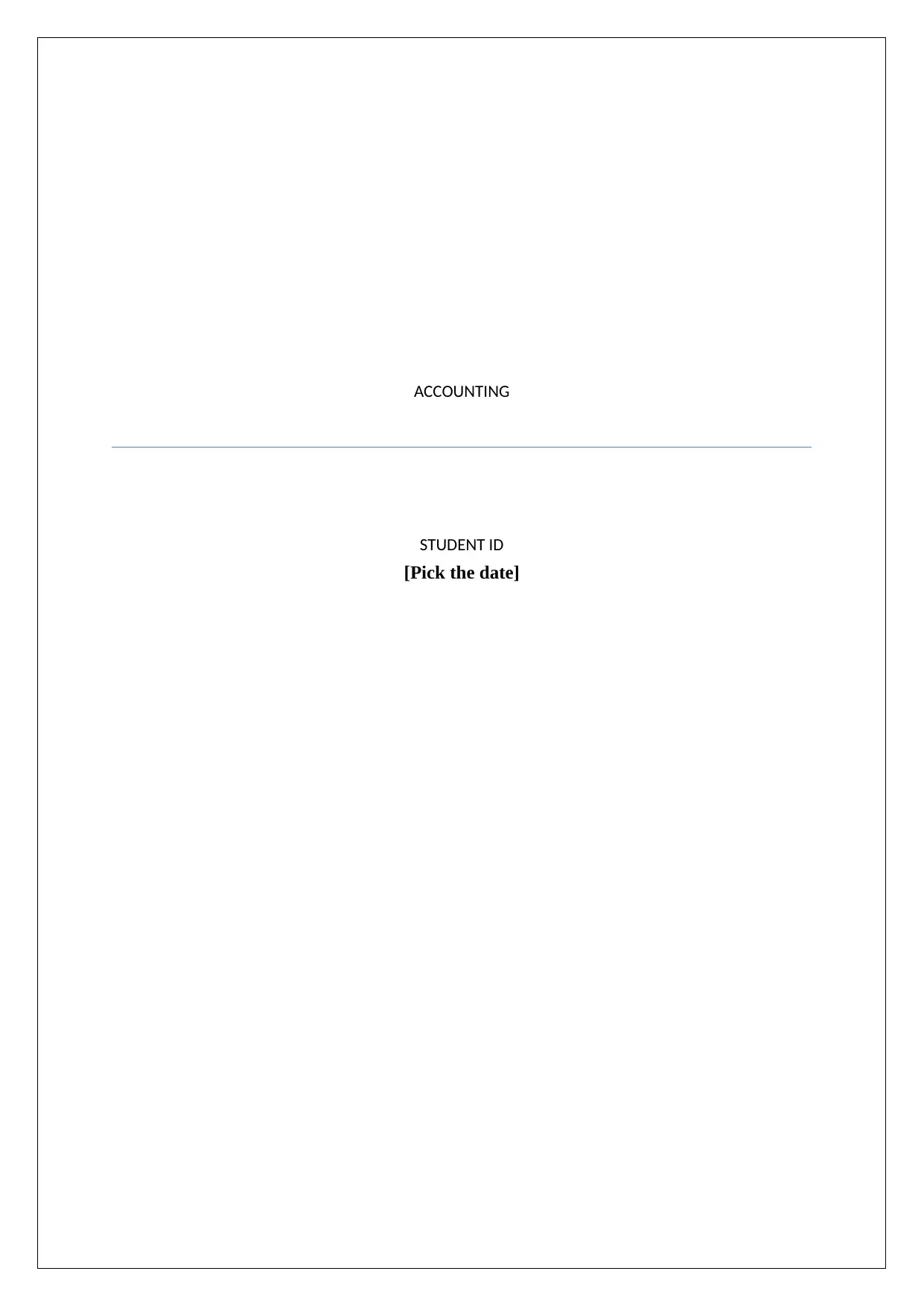
ACCOUNTING
STUDENT ID
[Pick the date]
STUDENT ID
[Pick the date]
Paraphrase This Document
Need a fresh take? Get an instant paraphrase of this document with our AI Paraphraser
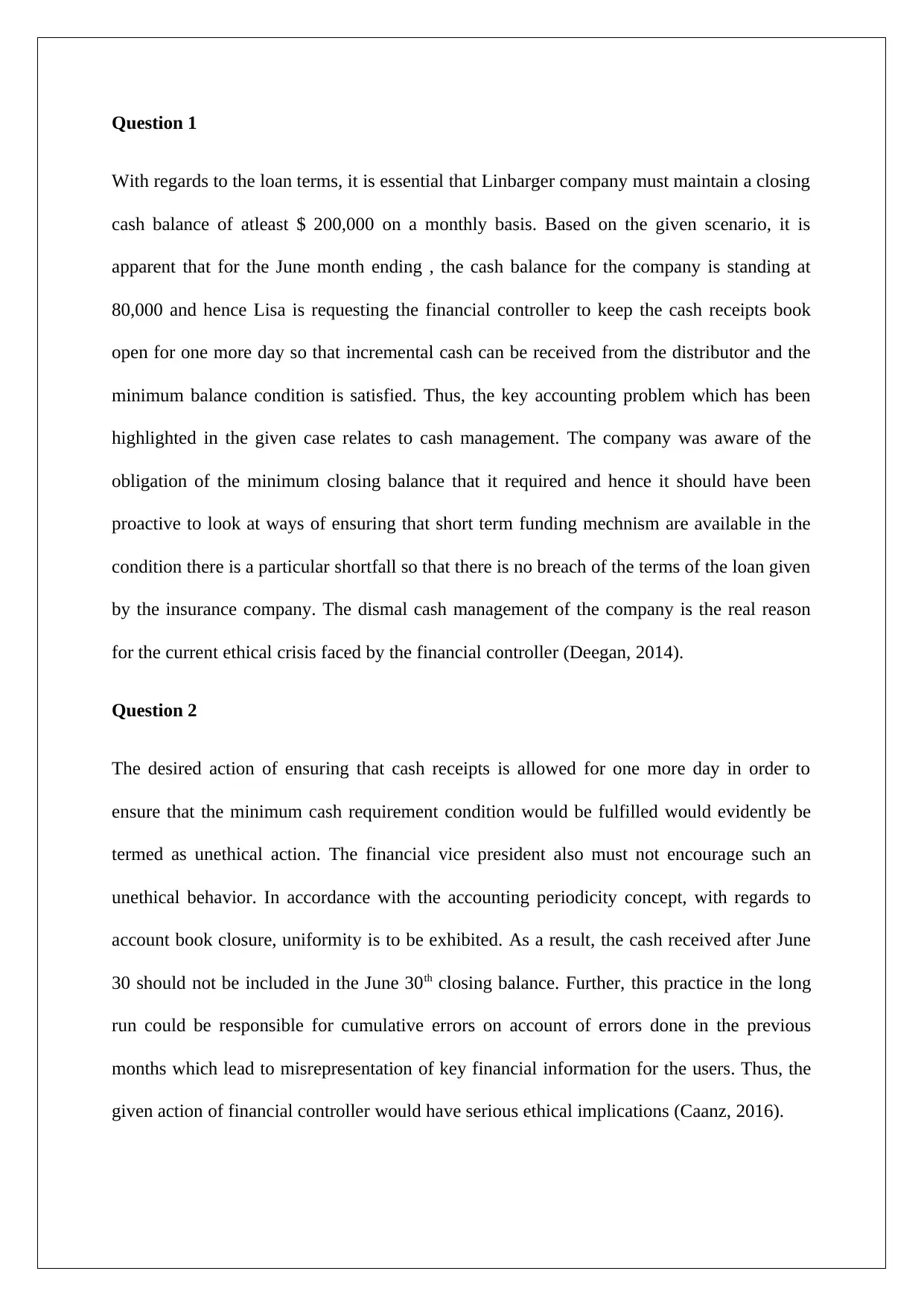
Question 1
With regards to the loan terms, it is essential that Linbarger company must maintain a closing
cash balance of atleast $ 200,000 on a monthly basis. Based on the given scenario, it is
apparent that for the June month ending , the cash balance for the company is standing at
80,000 and hence Lisa is requesting the financial controller to keep the cash receipts book
open for one more day so that incremental cash can be received from the distributor and the
minimum balance condition is satisfied. Thus, the key accounting problem which has been
highlighted in the given case relates to cash management. The company was aware of the
obligation of the minimum closing balance that it required and hence it should have been
proactive to look at ways of ensuring that short term funding mechnism are available in the
condition there is a particular shortfall so that there is no breach of the terms of the loan given
by the insurance company. The dismal cash management of the company is the real reason
for the current ethical crisis faced by the financial controller (Deegan, 2014).
Question 2
The desired action of ensuring that cash receipts is allowed for one more day in order to
ensure that the minimum cash requirement condition would be fulfilled would evidently be
termed as unethical action. The financial vice president also must not encourage such an
unethical behavior. In accordance with the accounting periodicity concept, with regards to
account book closure, uniformity is to be exhibited. As a result, the cash received after June
30 should not be included in the June 30th closing balance. Further, this practice in the long
run could be responsible for cumulative errors on account of errors done in the previous
months which lead to misrepresentation of key financial information for the users. Thus, the
given action of financial controller would have serious ethical implications (Caanz, 2016).
With regards to the loan terms, it is essential that Linbarger company must maintain a closing
cash balance of atleast $ 200,000 on a monthly basis. Based on the given scenario, it is
apparent that for the June month ending , the cash balance for the company is standing at
80,000 and hence Lisa is requesting the financial controller to keep the cash receipts book
open for one more day so that incremental cash can be received from the distributor and the
minimum balance condition is satisfied. Thus, the key accounting problem which has been
highlighted in the given case relates to cash management. The company was aware of the
obligation of the minimum closing balance that it required and hence it should have been
proactive to look at ways of ensuring that short term funding mechnism are available in the
condition there is a particular shortfall so that there is no breach of the terms of the loan given
by the insurance company. The dismal cash management of the company is the real reason
for the current ethical crisis faced by the financial controller (Deegan, 2014).
Question 2
The desired action of ensuring that cash receipts is allowed for one more day in order to
ensure that the minimum cash requirement condition would be fulfilled would evidently be
termed as unethical action. The financial vice president also must not encourage such an
unethical behavior. In accordance with the accounting periodicity concept, with regards to
account book closure, uniformity is to be exhibited. As a result, the cash received after June
30 should not be included in the June 30th closing balance. Further, this practice in the long
run could be responsible for cumulative errors on account of errors done in the previous
months which lead to misrepresentation of key financial information for the users. Thus, the
given action of financial controller would have serious ethical implications (Caanz, 2016).
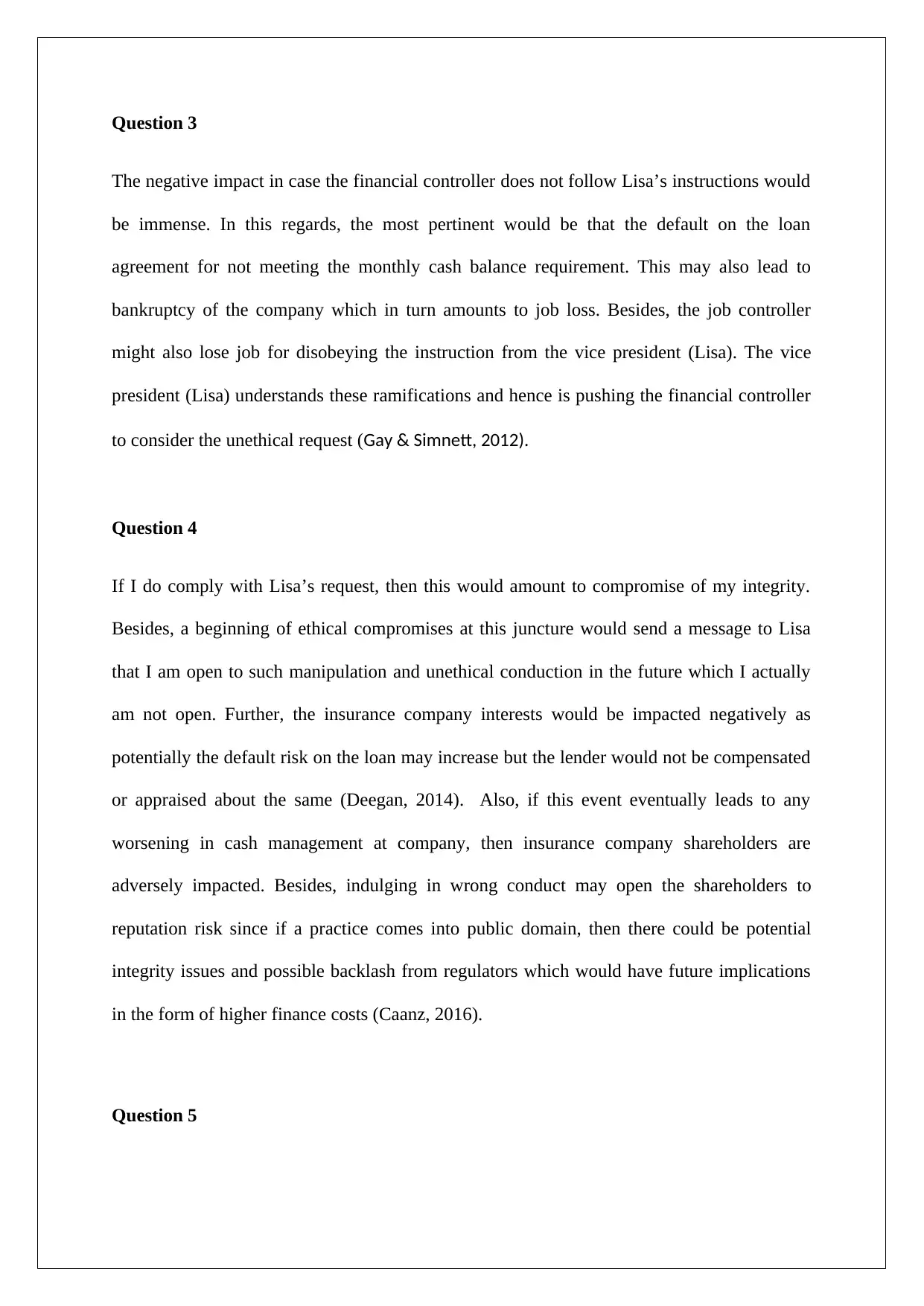
Question 3
The negative impact in case the financial controller does not follow Lisa’s instructions would
be immense. In this regards, the most pertinent would be that the default on the loan
agreement for not meeting the monthly cash balance requirement. This may also lead to
bankruptcy of the company which in turn amounts to job loss. Besides, the job controller
might also lose job for disobeying the instruction from the vice president (Lisa). The vice
president (Lisa) understands these ramifications and hence is pushing the financial controller
to consider the unethical request (Gay & Simnett, 2012).
Question 4
If I do comply with Lisa’s request, then this would amount to compromise of my integrity.
Besides, a beginning of ethical compromises at this juncture would send a message to Lisa
that I am open to such manipulation and unethical conduction in the future which I actually
am not open. Further, the insurance company interests would be impacted negatively as
potentially the default risk on the loan may increase but the lender would not be compensated
or appraised about the same (Deegan, 2014). Also, if this event eventually leads to any
worsening in cash management at company, then insurance company shareholders are
adversely impacted. Besides, indulging in wrong conduct may open the shareholders to
reputation risk since if a practice comes into public domain, then there could be potential
integrity issues and possible backlash from regulators which would have future implications
in the form of higher finance costs (Caanz, 2016).
Question 5
The negative impact in case the financial controller does not follow Lisa’s instructions would
be immense. In this regards, the most pertinent would be that the default on the loan
agreement for not meeting the monthly cash balance requirement. This may also lead to
bankruptcy of the company which in turn amounts to job loss. Besides, the job controller
might also lose job for disobeying the instruction from the vice president (Lisa). The vice
president (Lisa) understands these ramifications and hence is pushing the financial controller
to consider the unethical request (Gay & Simnett, 2012).
Question 4
If I do comply with Lisa’s request, then this would amount to compromise of my integrity.
Besides, a beginning of ethical compromises at this juncture would send a message to Lisa
that I am open to such manipulation and unethical conduction in the future which I actually
am not open. Further, the insurance company interests would be impacted negatively as
potentially the default risk on the loan may increase but the lender would not be compensated
or appraised about the same (Deegan, 2014). Also, if this event eventually leads to any
worsening in cash management at company, then insurance company shareholders are
adversely impacted. Besides, indulging in wrong conduct may open the shareholders to
reputation risk since if a practice comes into public domain, then there could be potential
integrity issues and possible backlash from regulators which would have future implications
in the form of higher finance costs (Caanz, 2016).
Question 5
⊘ This is a preview!⊘
Do you want full access?
Subscribe today to unlock all pages.

Trusted by 1+ million students worldwide
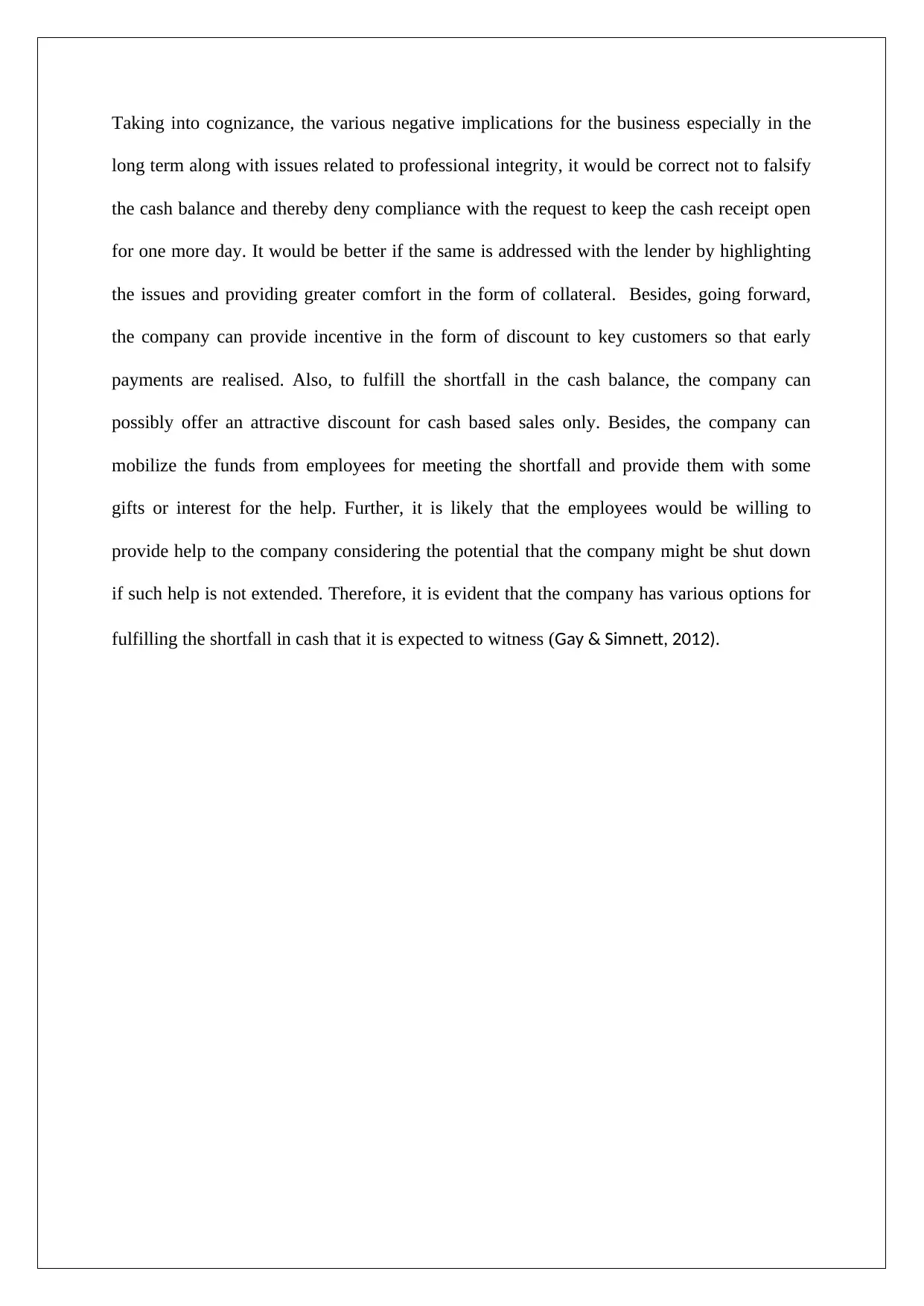
Taking into cognizance, the various negative implications for the business especially in the
long term along with issues related to professional integrity, it would be correct not to falsify
the cash balance and thereby deny compliance with the request to keep the cash receipt open
for one more day. It would be better if the same is addressed with the lender by highlighting
the issues and providing greater comfort in the form of collateral. Besides, going forward,
the company can provide incentive in the form of discount to key customers so that early
payments are realised. Also, to fulfill the shortfall in the cash balance, the company can
possibly offer an attractive discount for cash based sales only. Besides, the company can
mobilize the funds from employees for meeting the shortfall and provide them with some
gifts or interest for the help. Further, it is likely that the employees would be willing to
provide help to the company considering the potential that the company might be shut down
if such help is not extended. Therefore, it is evident that the company has various options for
fulfilling the shortfall in cash that it is expected to witness (Gay & Simnett, 2012).
long term along with issues related to professional integrity, it would be correct not to falsify
the cash balance and thereby deny compliance with the request to keep the cash receipt open
for one more day. It would be better if the same is addressed with the lender by highlighting
the issues and providing greater comfort in the form of collateral. Besides, going forward,
the company can provide incentive in the form of discount to key customers so that early
payments are realised. Also, to fulfill the shortfall in the cash balance, the company can
possibly offer an attractive discount for cash based sales only. Besides, the company can
mobilize the funds from employees for meeting the shortfall and provide them with some
gifts or interest for the help. Further, it is likely that the employees would be willing to
provide help to the company considering the potential that the company might be shut down
if such help is not extended. Therefore, it is evident that the company has various options for
fulfilling the shortfall in cash that it is expected to witness (Gay & Simnett, 2012).
Paraphrase This Document
Need a fresh take? Get an instant paraphrase of this document with our AI Paraphraser
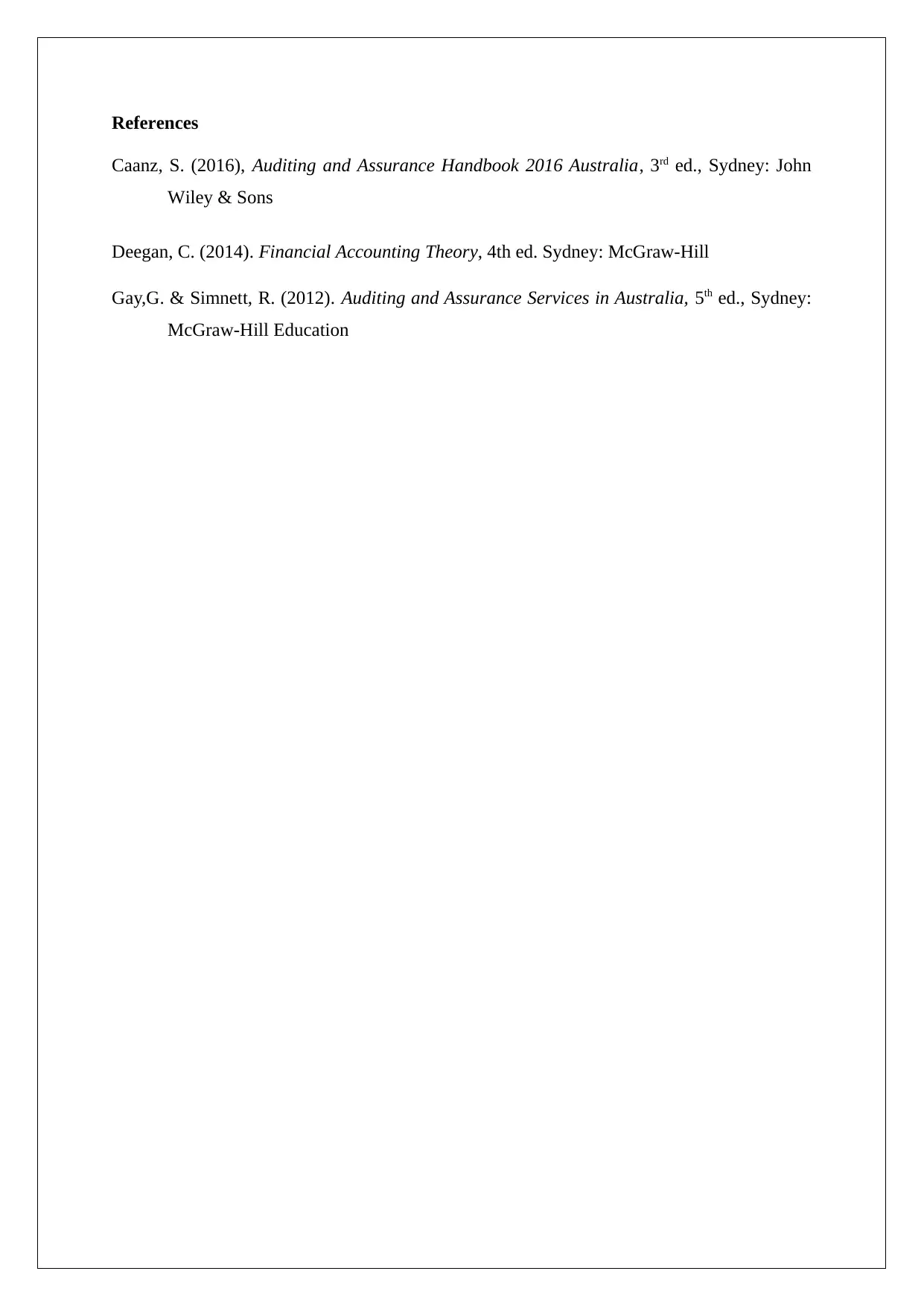
References
Caanz, S. (2016), Auditing and Assurance Handbook 2016 Australia, 3rd ed., Sydney: John
Wiley & Sons
Deegan, C. (2014). Financial Accounting Theory, 4th ed. Sydney: McGraw-Hill
Gay,G. & Simnett, R. (2012). Auditing and Assurance Services in Australia, 5th ed., Sydney:
McGraw-Hill Education
Caanz, S. (2016), Auditing and Assurance Handbook 2016 Australia, 3rd ed., Sydney: John
Wiley & Sons
Deegan, C. (2014). Financial Accounting Theory, 4th ed. Sydney: McGraw-Hill
Gay,G. & Simnett, R. (2012). Auditing and Assurance Services in Australia, 5th ed., Sydney:
McGraw-Hill Education
1 out of 5
Related Documents
Your All-in-One AI-Powered Toolkit for Academic Success.
+13062052269
info@desklib.com
Available 24*7 on WhatsApp / Email
![[object Object]](/_next/static/media/star-bottom.7253800d.svg)
Unlock your academic potential
Copyright © 2020–2026 A2Z Services. All Rights Reserved. Developed and managed by ZUCOL.





